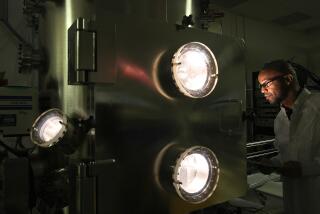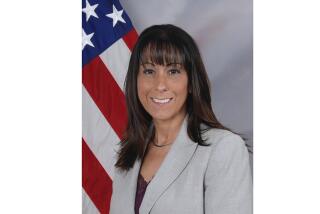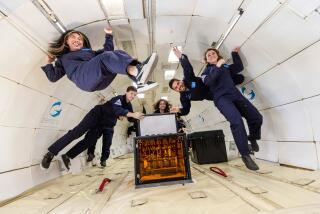Possible Espionage Probed at NASA Research Center : Security: FBI, space agency search through records at office specializing in aeronautics and computer science.
SAN FRANCISCO — The FBI and the inspector general of the National Aeronautics and Space Administration are investigating potential espionage and criminal activity at a NASA research center in Mountain View that specializes in aeronautics and computer science.
A 30-member management review team, which included aeronautics, security and legal experts, spent about a week in August at Ames Research Center. The searches of government records angered Asian employees, who complained that they were being unfairly targeted, NASA officials said.
As a result of the review, the FBI is looking into “whether any criminal activity exists and/or counterintelligence concerns,” said Rick Smith, an FBI spokesman in San Francisco.
He added that “the phrase counterintelligence connotes a lot of things, ranging from security concerns to espionage and we haven’t ruled out or ruled in anything in either of those areas.”
The internal NASA investigation is expected to be completed next month, according to a statement issued Wednesday by the agency.
No arrests have been made and no charges have been filed.
The NASA statement said that Ames is considered “high risk for hostile intelligence operations” and that the center “exacerbated a marginally effective security posture by not focusing appropriate management attention on the handling of sensitive technology.”
FBI and NASA officials would release only sketchy details about the concerns at Ames.
But Tom Betterton, a NASA consultant who served as senior member of the agency’s review team, said, “It is not really that big a deal at this time. The concern is procedures.”
As world trade competition intensifies, Betterton said, “we have to be more sensitive to the economic ramifications of the things we do. We have not been sensitive to economic espionage in the past.”
According to the NASA statement, the Ames “culture is strongly biased toward maintaining an academic reputation, rather than meeting U.S. industry and national needs.”
Consequently, “some of NASA’s customers and partners are reluctant to share important data with NASA for fear it will be disseminated with little or no regard for its sensitivity,” the statement said.
NASA said the management review team does not think other agency research centers suffer from the same problems that Ames apparently does.
Jack Stanley, chief of security for Ames, said in a 1988 interview with The Times that the center was “a modest target” for espionage, where the greatest danger was for “tech transfer.”
About 10% of Ames research is classified for national security reasons, Stanley said. The classified work mostly involves aircraft testing. The center also tests prototypes for private aerospace companies. At the time of the interview, Stanley said that fewer than 10% of the center’s employees were foreign nationals.
“We haven’t been involved in any of the famous cases,” he said. “But the FBI and CIA tell us that we have to be ever-vigilant.”
Pasternak reported from Los Angeles and Paddock from San Francisco. Times staff writer Dan Morain contributed to this article.
More to Read
Sign up for Essential California
The most important California stories and recommendations in your inbox every morning.
You may occasionally receive promotional content from the Los Angeles Times.










